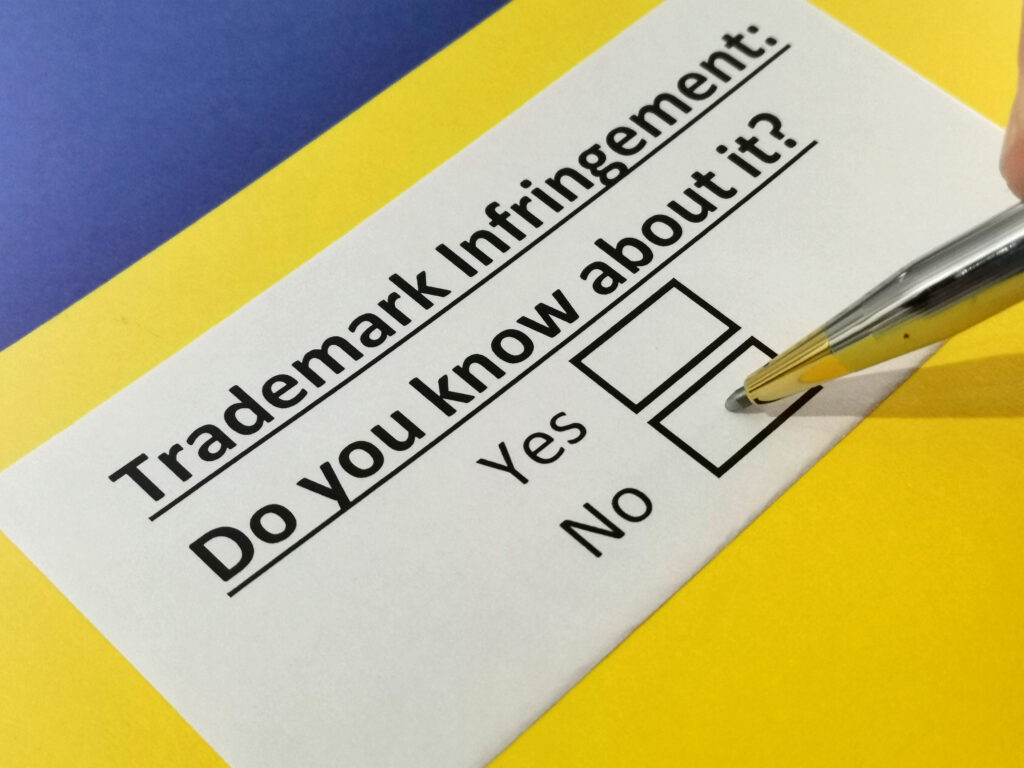Arizona Trademark Infringement Attorney

As a business owner, your trademark is a vital asset. But what happens when someone else uses a confusingly similar mark, potentially misleading consumers and harming your business? That’s where trademark infringement comes in.
Consulting with an Arizona trademark infringement attorney (a.k.a. intellectual property lawyer) is highly recommended for any specific trademark concerns. A trademark infringement attorney dedicates their service to safeguarding and upholding the rights of inventors, creators, and enterprises regarding their intellectual assets, such as patents, trademarks, copyrights, and trade secrets.
At Lerner and Rowe, we provide free consultations for individuals who suspect infringement on their trademarks. Contact us online now through our confidential online form or via LiveChat to start the legal process and learn more about your options.
What Is a Trademark?
According to The United States Patent and Trademark Office, a trademark is:
- Any word, phrase, symbol, design, or a combination of these things that identifies the source of your goods or services.
- How customers recognize you in the marketplace and distinguish you from your competitors.
- A reference to both trademarks and service marks. A trademark is used for goods, while a service mark is used for services.
A trademark can also provide legal protection for your brand, as well as help you guard against counterfeiting and fraud.
Recognizing Trademark Infringement
The first step of the legal process is understanding what constitutes trademark infringement. Simply put, infringement occurs when a competitor uses a mark that is confusingly similar to yours in a way that’s likely to deceive consumers about the origin of goods or services.
Here are some key factors a trademark infringement attorney will consider:
- Similarity of Marks: How closely do the marks resemble each other in sound, appearance, and meaning? A slight variation might not be enough to avoid infringement.
- Strength of Your Trademark: Distinctive and unique marks enjoy broader protection than generic or descriptive ones.
- Proximity of Goods/Services: Do the competing marks identify similar products or services? Consumers are more likely to be confused in such cases.
- Likelihood of Confusion: This is the ultimate question. Would a reasonable consumer be misled about the source of goods or services based on the similarity of the marks?
If you believe your trademark is being infringed, it’s crucial to act promptly. Why? This confusion can lead to lost sales, damage to your brand reputation, and even customer dissatisfaction. Delay can also weaken your case and allow the infringer’s use to become established.
Addressing Trademark Infringement
There are several ways to address trademark infringement, and the best course of action depends on the specific situation. Here are two common approaches an attorney may initially take:
- Cease and Desist Letter: This formal letter, drafted by an attorney, informs the infringing party that their use of the mark is unlawful and demands they stop. It’s a cost-effective way to resolve the issue without litigation.
- Negotiation and Settlement: Often, a negotiated settlement can be a practical solution. This might involve the infringing party agreeing to modify their mark or ceasing use altogether, potentially in exchange for a fee.
Filing a Trademark Infringement Lawsuit

If a cease and desist letter or negotiation is unsuccessful, filing a trademark infringement lawsuit may be necessary. This is a complex legal process that requires an experienced intellectual property lawyer.
Here’s a simplified breakdown of the trademark infringement lawsuit process:
- Complaint: Your attorney will draft a legal document outlining the infringement claim, including evidence of your trademark ownership and the infringing use.
- Discovery: This phase involves exchanging information and evidence between the parties.
- Trial: If a settlement isn’t reached, the case goes to court, where a judge or jury decides whether infringement has occurred.
- Remedies: If successful, you may be awarded injunctive relief (ordering the infringing use to stop), monetary damages for lost profits or harm to your brand, and attorney’s fees.
Important Considerations Prior to Filing a Lawsuit
Before taking the leap into litigation, here are some essential considerations:
- Federal vs. State Lawsuit: You can file a trademark infringement lawsuit in federal court or state court.
- Federal courts offer broader geographic reach and potentially more favorable precedents for trademark owners.
- State courts might be quicker and less expensive, but their decisions may not have national significance.
- Cost and Time Commitment: Trademark lawsuits can be expensive and time-consuming. Be prepared for a potentially lengthy process with associated legal fees.
- Relationship with the Infringer: If you have an ongoing business relationship with the infringing party, a lawsuit may damage that relationship. Consider if there’s a way to resolve the issue without resorting to litigation.
When to Hire a Trademark Infringement Attorney
While some preliminary steps in addressing trademark infringement can be taken independently, involving an attorney is highly recommended for several reasons:
- Evaluating Your Case: An attorney can assess the strength of your claim and advise you on the best course of action.
- Legal Expertise: Trademark law is complex, and an attorney understands the nuances and legal requirements involved in filing a lawsuit.
- Strategic Guidance: They’ll guide you through the litigation process, representing your interests effectively in court.
- Negotiation and Settlement: An attorney can negotiate a favorable settlement on your behalf, potentially avoiding a costly lawsuit.
Protecting your trademark is essential for safeguarding your brand identity and business reputation. By understanding the signs of trademark infringement and your available options for addressing the issue, you can take decisive action. While some initial steps might be undertaken independently, consulting with a qualified trademark infringement lawyer is crucial for effective protection and litigation success.
Don’t hesitate to seek top legal counsel to ensure your trademark rights are effectively enforced! Contact Lerner and Rowe online now through LiveChat or our FREE online form. Representatives are available 24/7 and consultations are always free. You have nothing to lose, and much to gain!



